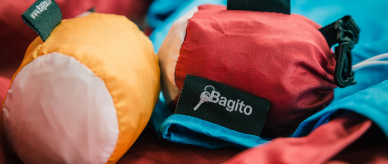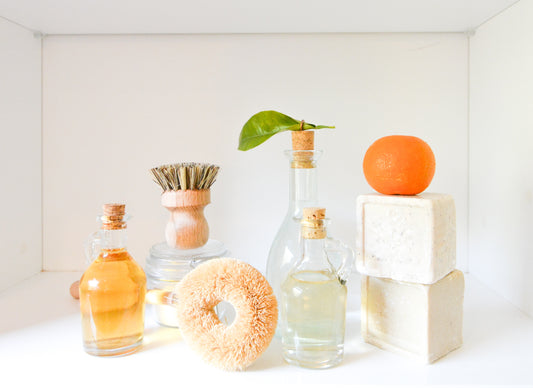One of the core tenets of sustainable living is minimizing the amount of waste you produce. As impossible of a task as it may sound, it is surprisingly much easier than it appears. Here are ten simple ways to develop a zero-waste lifestyle.
1.) Reduce, Reuse, Recycle

The "Three R's" have been a common refrain for developing an eco-friendly habit, but what does it look like in practice? Simply tossing a plastic bottle into the recycling bin once in a while isn't a very sufficient way to minimize your waste footprint, especially when some plastics may not be easily recyclable. Instead of throwing away plastic water or soda bottles, you should instead consider keeping it to refill it with water for later. They are easy to rinse out and the plastic often has an indefinite shelf life. Not only are you reducing the usage of plastic, but you are also reusing what is already available. If something could be reused, reuse it whenever you can. Similarly, if something could be recycled, recycle it whenever you can.
Another thing to keep in mind with the "Three R's" is that they are in order of importance. Reducing the accumulation of materials you use on a daily basis ultimately reduces the amount of waste you would produce, hence why it sits atop the waste hierarchy. Reducing doesn't exactly mean buying less essential goods like food, but it does mean buying less products that produce more waste, such as packages that use single-use plastics. The smallest changes in your daily life can make a noticeable difference.
2.) Secondhand Electronics

One of the more overlooked aspects of consumer-produced waste is e-waste, or electronic waste. Electronic devices deemed obsolete or nonfunctional often find themselves in landfills, which could threaten local ecosystems with harmful chemicals. There's much to discuss with e-waste alone, so we will focus on secondhand electronics for now. Secondhand electronics involves purchasing pre-owned or refurbished devices from retailers. They are easy to come by and often provide better value to consumers than the latest cutting-edge in the market. From computers to cell phones to video games, the secondhand market is an excellent resource to get upgrades to your older devices. You can also sell your used electronics to these marketplaces or even trade them in to your phone carrier for a good deal!
3.) Thrifting

Thrift stores often offer a suite of lightly used clothing of all shapes and sizes. If you are in need of new clothes, consider visiting your local thrift stores first to get what you're looking for for an affordable price. In addition to supporting small businesses, you also avoid financially supporting the wasteful clothing industry. If thrifting is not a viable option for you, there are clothing brands that do produce apparel made out of recycled materials.
4.) Upcycling

Not to be confused with recycling, upcycling is a clever way to give your old furniture a new life. While this requires a more industrious and handyperson mindset, it's a project worth pursuing if you have an old cabinet or table that desperately needs a makeover. You can even upcycle smaller items like worn down clothes if you need more fabric to use as yarn, or you could tear up an old t-shirt as a washing cloth. Not everything needs to be thrown out, even if it's something that's beyond repair.
5.) Composting

This may not be the most suitable choice for those who lack a garden or yard to fertilize. However, it's still an excellent option to eliminate food waste, such as orange rinds, banana peels, and fruit pits. Most moldy or overripe fruits and vegetables could be used for composting, unless they possess harmful bacteria like salmonella or listeria. Always do your research before beginning your compost. However, if you plan to maintain a garden, composting is a great way to develop your homemade fertilizer while minimizing any food waste landing in the trash can.
6.) Zero-Waste Toiletries

The ordinary bathroom is replete of plastic items and bottles designed to be thrown out when you have depleted their contents. Toothpaste, soap, shampoo, conditioners, moisturizers, and other skincare products are often housed in plastic containers. But it doesn't have to be so wasteful. Bar soap is a common hand and body wash choice for consumers, but not many are aware of bar shampoo and conditioners. Worn down toothbrushes will have to be replaced, but they don't always need to be thrown out either. They can instead be used as a traditional cleaning brush used for smaller accessories.
7.) Embrace Biodegradable Products

Biodegradable materials have been becoming more popular as of late, especially in the form of plastic alternatives. Technology has been advancing to such a degree where biodegradable/compostable plastic can fully break down much quicker than before. It will only be a matter of time before this will become the standard biodegradable material. Whether it be plastic utensils or “K-cups”, you can pretty easily find biodegradable alternatives for a variety of products. While it may involve some additional research for everyday items, it’s worth the effort if you wish to commit to a fully zero-waste lifestyle.
8.) Forgoing Food Waste

Throwing away old uneaten leftovers can be hard to stomach, but there are ways to circumvent that. You can optimize the proportions of your meals without having to worry about making too much food. If you have lots of leftovers from a holiday feast, you could give some to people you know such as neighbors or family, or you could freeze some perishable foods so they can last for a much longer time. Outside of dealing with leftovers, you can also minimize food waste on a collective level as well by donating some food items to a food pantry. To help reduce food waste on a more industrial level, you could also use grocery delivery services that claim irregular or unwanted produce from multiple retailers, such as Imperfect Foods.
9.) Donating Old/Used Clothes

Outside of thrifting or upcycling, another way to give your clothes a new life is to give it to those in need. If you especially have a used coat or warm sweater that is not too worn down, it would be a good idea to donate it to a charity or to a textile maker so the fabrics could be recycled.
10.) Host a Garage Sale

If you have a large assortment of antiques or goods you just don’t want around the house anymore, it might be a good time to prepare a garage sale. Preparing a garage sale requires a considerable amount of planning, but it’s worth doing to remove some clutter while making a small sum of money in the process. There might be someone around the neighborhood interested in reading that decades-old book that has been collecting dust in your house for years!

Verte Mode is committed to educating people on making the best sustainable habits and practices to make Earth a healthier planet for future generations. Join the movement by reading more about our mission and listening to our podcast!













